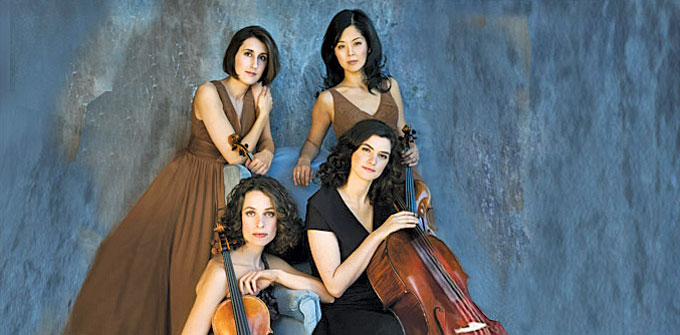Hail! Bright Cecilia
by Jan Jezioro

The Cecilia String Quartet makes its Buffalo debut
Saint Cecilia is celebrated on her feast day of November 22 as the patron saint of musicians in the Roman Catholic, Anglican, Eastern Orthodox, and Eastern Catholic Churches. The celebration of the martyrdom of Saint Cecilia, commemorated on her feast day, has been the inspiration for the composition of many classical music works, the most famous of which is undoubtedly English composer Henry Purcell’s 1692 work, Hail! Bright Cecilia, also known as the Ode to St. Cecilia. So when a group of young female musicians at the University of Toronto decided to found a new professional string quartet a few years ago, they happily looked to the patroness of music when choosing their name.
The Buffalo Chamber Music Society’s 88th series season continues in the Mary Seaton Room of Kleinhans Music Hall at 8pm on Tuesday, January 31, with a performance by the four young Canadian women who make up the Cecilia String Quartet: violinist Min-Jeong Koh, who plays on the 1767 Joannes Baptista Guadagnini violin on loan from the Canada Council for the Arts; violinist Sarah Nematallah, who currently plays on the 1851 Jean Baptiste Vuillaume violin, on loan from an anonymous donor; violist Caitlin Boyle; and cellist Rachel Desoer.
Some members of the audience at the Mary Seaton Room, though probably not very many, may have made the trip across the border last summer, to hear the Cecilia String Quartet, in their series debut at St. Mark’s Episcopal Church, as part of the Music Niagara Festival, in Niagara-on-the-Lake; for reasons that are unknown, the number of America visitors who attend any of the several dozen events at this wonderful, nearby summer event remains very low.
The Cecilia String Quartet soon won acclaim for “extraordinary commitment and maturity,” according to the Montréal Gazette. Prizewinners at international string quartet competitions in both Osaka, Japan in 2008 and Bordeaux, France, in 2010 and the winners of a Galaxie Rising Stars Award in Canada, the group went on to capture the First Prize at the Banff International String Quartet Competition, Canada’s most prestigious, in 2010. “With a stunning spirit of creativity that consistently celebrated risk-taking and discovery, the Cecilia Quartet impressed the distinguished jury above all others,” said the competition’s executive director, Barry Shiffman, when announcing the winners. “The balance between expressiveness and interplay was almost dauntingly perfect,” wrote the Berliner Zeitung after a performance in the Konzerthaus Berlin.
The Cecilia Quartet now performs for leading presenters in both Canada and the United States, where their spring tour will also include performances in New York City and Washington, DC. The members of the group are currently Quartet Fellows at the Glenn Gould School of the Royal Conservatory of Music in Toronto.
Franz Josef Haydn is credited with being the father of the string quartet, and his 67 published string quartets still form the backbone of the quartet repertoire. The Cecilia Quartet will perform Haydn’s last published quartet, the Quartet in F major, Op. 77, No.2, one of the pair of quartets that Haydn dedicated to his patron, Prince Joseph Franz Maximilian Lobkowicz, the aristocrat who later became a major patron of Beethoven and the dedicatee of his Opus 18 set of quartets, as well as his 3rd, 5th and 6th symphonies. The Opus 77 works are the summit of Haydn’s achievement in the quartet genre, and the noted Haydn scholar Karl Geringer has observed that the works were composed “when true expression seemed more important to Haydn than a perfect balance between form and content.” Antonin Dvorák composed his penultimate string quartet, the No. 13 in G Major, Op. 106 in 1895, the year in which he returned to Europe from America and in which both his sister-in-law and his first love died, and the work has a much darker tone than the composer’s American Quartet, its immediate predecessor. Shostakovich composed his String Quartet No. 7 in F sharp minor, Op. 108, in 1960, in memory of his first wife Nina Vassilyevna, and the three movements of the work, which is Shostakovich’s shortest quartet, are played without a break.
Tickets are $20 geberal admission, $10 for students. For more information, visit: www.bflochambermusic.org.
blog comments powered by Disqus|
Issue Navigation> Issue Index > v11n3 (Week of Thursday, January 19th) > Hail! Bright Cecilia This Week's Issue • Artvoice Daily • Artvoice TV • Events Calendar • Classifieds |









 Current Issue
Current Issue